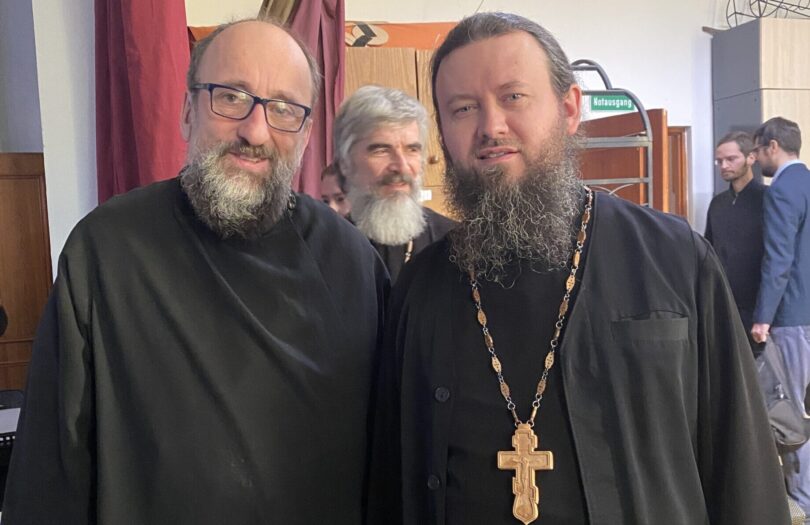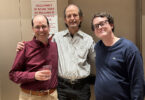In 2023, I was invited to present a report at the annual assembly of the German Diocese. My report was dedicated to the 75th anniversary of Holy Trinity Orthodox Seminary.
At the assembly, I was particularly impressed by the way Anastasia Limberger moderated discussions in the session dedicated to participation in the sacrament of confession. Bishop Job of Stuttgart, the diocesan vicar, along with priests and laypeople, thoughtfully exchanged experiences of Christian life. This “horizontal” rather than “vertical” (top-down) model of communication within the Church left a strong impression on me.
Traditionally, the assembly takes place during the Christmas holidays at the Cathedral of the Holy New Martyrs and Confessors of Russia in Munich. Each year, a meeting of youth “activists” from different parishes of the diocese precedes the assembly.
Father Alexei Lemmer, the spiritual mentor of the Russian Orthodox Youth of Germany (Russische Orthodoxe Jugend) organization, actively participates in these meetings. Father Alexei is an alumnus of Holy Trinity Orthodox Seminary (class of 2008), so it was a joy to meet with him. (I remember that Fr. Alexei reviewed for my canon law class the book Die Oikonomia nach dem kanonischen Recht der Orthodoxen Kirche by the Greek Theologian Hamilkar Alivizatios.)
At the end of my report, I asked the audience what they thought the reason was that the Russian Orthodox Church Abroad needs a seminary and intellectual center in Jordanville. I hope that the answer to this question will be a cooperation between the German Diocese and Holy Trinity Orthodox Seminary.
Protodeacon Andrei Psarev, August 31, 2024
Father Alexei, could you please tell us about your role in youth work within the German Diocese?
In 2019, I became involved with this mission. At the time, I was asked to take part in youth work within the German Diocese. By that time, I had already been serving as a priest for eight years and had observed how this work was being done. Although many young people had been calling me to join this movement earlier, I had several parishes and was constantly traveling, so it was difficult to get involved. In 2019, the late ever-memorable Archbishop Agapit approached me and asked about it, saying, “We consulted with Archpriest Ilya Limberger, who has been leading diocesan youth work for many years, and we would like you to take on an active role in it. Father Ilya has done much, but he needs help, a successor to continue the work. Father Ilya will continue his involvement, but the youth work itself is growing.” He needed additional support.
Therefore, in 2019, I joined and began attending events. Later, of course, there was a brief lull in activity due to the COVID-19 restrictions on large gatherings; we couldn’t hold many events. However, in 2023, as well as in 2022 and 2024, many events were and are being held. In this ministry, I am an assistant and, you could say, a support for Father Ilya, who started the diocesan youth work 25 years ago and developed it. Father Ilya worked very hard in the beginning to get everything off the ground, and gradually the work began to grow. My task is to grow into this youth work, to continue it, and to preserve the traditions and spirit of love with which Father Ilya created it, keeping the trust of the youth. We don’t just hold events; we aim to engage and activate the youth in a way that avoids monologues where we simply speak to them.
We seek to foster an atmosphere of conversation, of dialogue. So that they take an active role, we entrust them with projects; we ourselves just support them, answering their questions, and so on. In other words, we do not limit or restrict the youth. We give them the freedom to develop in the spirit of Orthodoxy, in the spirit of our church life. Our young people are very creative and vibrant, which of course leads to a situation where, with God’s help, we hold various events, and many are eager to participate. I am very glad that the youth work, thank God, is in such a developing state and is highly active.
Also, Father, from what I hear, it can even be said that you, the clergy, are also learning from the youth?
Definitely. Because we grow together. We give them something, but we also receive a lot from them. It is a mutual process of growth.
I see. And this organization, which is pan-German, can you tell us about it, its name? What is it?
It is a pan-German organization called die Russische Orthodoxe Jugend in Deutschland (shortened to ROJ DE or ROJ Deutschland). In translation, it means “Russian Orthodox Youth of Germany”. It was created in 2022, but we were preparing it for two years, making sure to structure it in a way that complies with all relevant laws and regulations.
The organization was founded in our city, where I serve, at the Church of St. Sergius of Radonezh in Bad Kissingen, in May of 2022. There was a meeting of clergy and young people right when it was officially registered.
What is this organization?
It is an association for all young people from different jurisdictions of the Russian Orthodox Church. Hence it includes youth from the Russian Orthodox Church Outside of Russia, the Diocese of the Moscow Patriarchate, and the Paris Archdiocese, which also has parishes here in Germany. The goal of the organization is to unite youth from different dioceses and create a structure at a pan-German level. Before this, some people were working with youth as a personal initiative here and there, but by creating this organization, we brought together Orthodox young people along with their parish youth groups. The ROJ organization is seen as an umbrella organization (Dachverband), which includes parish structures, and above them, regional structures. This structuring of the organization allows us to receive state grants in Germany and officially train young people in parish youth work. For example, if someone in a parish doesn’t know how to launch youth work, our pan-German organization takes responsibility for organizing meetings with the youth of a particular parish, even sometimes remotely, and provides instructions, helping them get off the ground. This is very important because we are not divided by “jurisdictions” but are united so that all youth feel the unity of the Russian Church. We try to maintain that unity, to make them feel that we are all one, and not as it was before, you couldn’t go to that parish, couldn’t commune in another, etc. because it was not one of “ours.” In other words we bring everyone together. We also hold an annual pan-German conference through ROJ, where the leadership of the organization and its members gather as representatives of their parishes.
What events have been held recently, and what has been accomplished?
The Cologne Conference (Syezd), for example, held in June, is a theological-philosophical conference where youth from various parishes in Germany gather for five days to discuss theological and philosophical topics. The event has a rich program that includes presentations, services, hikes, an outdoor ball, and trips into the city, etc. Then, we have the annual procession from the Monastery of St. Job of Pochaev to the Dachau concentration camp in early May. One of the prisoners there was St. Nicholas of Serbia. Along the approximately 18km route, we stop to read the writings of St. Nicholas, participate in monastery services, and on Sunday, there is a lecture on St. Nicholas at the University of Munich. We also hold an annual three-day youth conference of the ROJ youth organization in Bad Kissingen, which attracts up to 140 participants. In October, there is an annual event focused on caring for the historic cemetery in Wiesbaden, as well as joint services and walks. Then balls, of course, have also become very popular among the youth. They used to be held once or twice a year, but now there are many more, organized by the youth themselves in different cities. We only come to support them and show that we are with them. Besides balls, there is also a winter conference, which just ended. From December 22–26, 2023, the 9th Youth Conference was held in Munich, for those already engaged in youth work, the leaders of the youth movement, or those with no experience but come to that conference to learn.
So, is this a more exclusive event?
Yes. The number of participants is, let’s say, only about 50 people, whereas at other events, which are open to everyone, there are usually many more—sometimes 100, 120, or even 140 people. Here, we have a more focused audience, where we specifically try to improve the quality of youth work in our parishes. This is for both those who are already involved in such work and those who are not yet, but are interested. We aim to provide them with all possible information, support, reinforcement, and inspiration.
That’s exactly what happens. Over the past few years, we’ve seen significant growth in youth activities within the parishes. Young people who attend these gatherings return motivated and start initiatives from scratch – organizing meetups, regular meetings, film clubs, trips, and so on. They start small, and over time, it grows into regular meetings and collaborative events.
It even reaches the point, for example, in Mannheim, where there initially wasn’t any youth presence, but they’ve grown so much that they now organize balls, youth conferences, and are even preparing their first festival this fall. That’s very encouraging. Overall, we hold about 12-14 events annually at the all-German level, including youth retreats, seminars, conferences, balls, etc.
Father Alexei, does the issue of language arise? I noticed that yesterday, everyone spoke freely in Russian. But is there youth for whom Russian is a problem, which makes them unable to participate?
Most of our youth events are conducted in Russian, but the Russian Orthodox Youth/ROJ organization, starting from the inaugural meeting in 2022, chose German as its working language. Last year, 140 participants attended the ROJ conference, and all lectures and the entire conference were conducted in German. Of course, the youth spoke Russian among themselves, but the official parts of the conference and the annual meeting were in German. This is great demand for this now. The Cologne conference this year, for example, was conducted in Russian, with eight presentations, but there was simultaneous interpretation of all presentations and discussions into German. The rest of our events are conducted in Russian. However, our goal is to develop festivals and conferences in German as well; none of the youth feel like they can’t attend due to the language. Many of the youth grew up or were born here, and for them, events held in German seem completely natural.
At many conferences, we could even provide simultaneous interpretation, offering everything in both Russian and German, or even announce around 70% of the information in German to ensure the youth could understand. However, with the arrival of refugees from Ukraine, we’ve noticed that we once again have to primarily use Russian because they don’t know German. As a result, in a way, we’re returning to Russian as the foundation of our mutual communication.
Thank you, Father. That wraps it up nicely.
(The interview was recorded early in the morning in a car on the way to the Divine Liturgy from the Monastery of St. Job to the Cathedral of the Holy New Martyrs and Confessors of Russia.)











